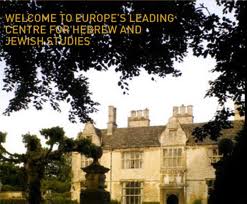
Applications are invited to participate in this workshop, to be held in Oxford, at the Oxford Centre for Hebrew and Jewish Studies at Yarnton Manor, on January 7-8, 2013.
Please submit your application in English, with a short CV and an abstract (not more than 500 words) of a research paper to be discussed in the workshop, to the Registrar of the Oxford Centre for Hebrew and Jewish Studies (registrar@ochjs.ac.uk), by Friday 14 September 2012.
Bursaries to cover travel expenses and accommodation will be available for selected participants. Please indicate in your application whether you would like to be considered for a bursary, including an estimate of your travel expenses.
The workshop will be devoted to discussion of the research papers, which will be circulated to all participants in advance.
Applicants will be informed of the result of their applications on or before Friday 21 September 2012.
The workshop will be the first in a series, as part of a project on the reception of Josephus in Jewish culture from the 18th century to the present. This project, which is funded by the AHRC, focuses on the ways in which Jews since the middle of the eighteenth century have built on earlier uses of Josephus’ writings for their own purposes, examining the reasons for fluctuations of interest over time and in different places and seeking to understand how such preferences were influenced by contemporary issues and how they in turn affected them. The project also looks at the impact of non-Jewish scholarship on Jewish interpretations of Josephus, and the extent to which Jewish attitudes to Josephus were affected by responses to the historian as a controversial participant in complex political events and as a moral agent.
In this first workshop, on the reception of Josephus by Jews and Christians before 1750, we hope that the participants will help us to identify the issues in Josephus’ writings which played a key role in the reception of his work in ancient and medieval times, investigating which themes are specific to specific periods or types of literature (including translations and adaptations into other languages, notably Latin and Hebrew) and which remained relevant in later centuries; the reasons why early modern scholars (both Jewish and Christian) were attracted to Josephus’ writings, and how their approach differed from earlier reception of Josephus; and the role played by Josephus in the popular imagination of Jews and Christians throughout this period.
Topics suitable for paper proposals for the workshop include the Testimonium Flavianum, patristic uses of Josephus, rabbinic references to Josephus in late antiquity, the manuscript tradition, Josippon, Azariah de’Rossi, uses of Josephus by Christian humanists in the early modern period, chronography, early printed editions, illustrations and artistic representations, and vernacular translations.
Further workshops will address the Jewish reception of Josephus in the 18th and 19th centuries in Western Europe (June 17-18, 2013); the Jewish reception of Josephus in the 19th and early 20th centuries in Eastern Europe (January 6-7, 2014); and the Jewish reception of Josephus in the 20th and 21st centuries (June 16-17, 2014).
We plan to publish a selection of the studies discussed at the four workshops in a volume, to share the results of the project and to help to define the agenda for future research.
To apply, and for further information about participation in the workshop and about bursaries, please contact the Registrar of the Oxford Centre for Hebrew and Jewish Studies (registrar@ochjs.ac.uk) before 14 September 2012.
Martin Goodman, Tessa Rajak, Andrea Schatz
